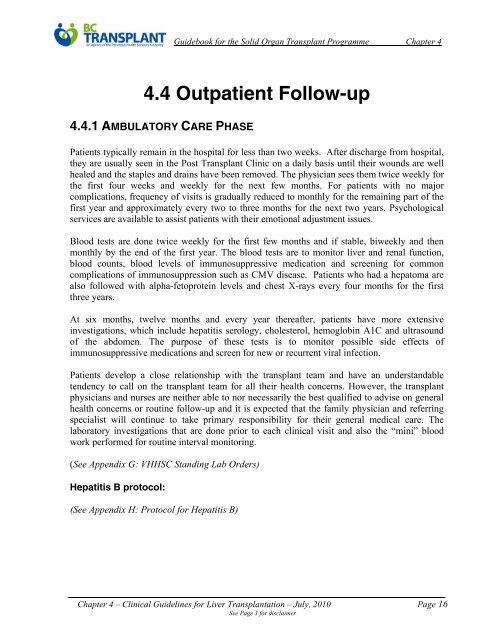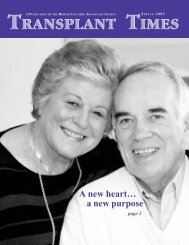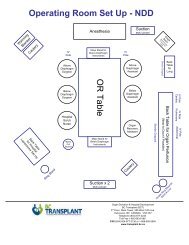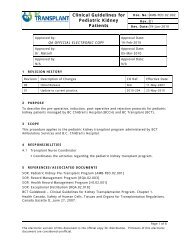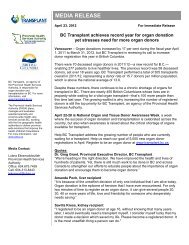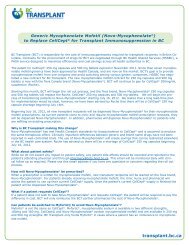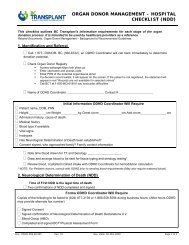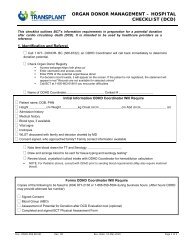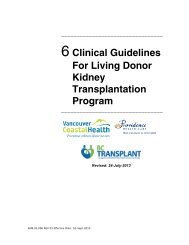4. Clinical Guidelines for Liver Transplantation (PDF) - British ...
4. Clinical Guidelines for Liver Transplantation (PDF) - British ...
4. Clinical Guidelines for Liver Transplantation (PDF) - British ...
You also want an ePaper? Increase the reach of your titles
YUMPU automatically turns print PDFs into web optimized ePapers that Google loves.
Guidebook <strong>for</strong> the Solid Organ Transplant Programme Chapter 4<br />
<strong>4.</strong>4 Outpatient Follow-up<br />
<strong>4.</strong><strong>4.</strong>1 AMBULATORY CARE PHASE<br />
Patients typically remain in the hospital <strong>for</strong> less than two weeks. After discharge from hospital,<br />
they are usually seen in the Post Transplant Clinic on a daily basis until their wounds are well<br />
healed and the staples and drains have been removed. The physician sees them twice weekly <strong>for</strong><br />
the first four weeks and weekly <strong>for</strong> the next few months. For patients with no major<br />
complications, frequency of visits is gradually reduced to monthly <strong>for</strong> the remaining part of the<br />
first year and approximately every two to three months <strong>for</strong> the next two years. Psychological<br />
services are available to assist patients with their emotional adjustment issues.<br />
Blood tests are done twice weekly <strong>for</strong> the first few months and if stable, biweekly and then<br />
monthly by the end of the first year. The blood tests are to monitor liver and renal function,<br />
blood counts, blood levels of immunosuppressive medication and screening <strong>for</strong> common<br />
complications of immunosuppression such as CMV disease. Patients who had a hepatoma are<br />
also followed with alpha-fetoprotein levels and chest X-rays every four months <strong>for</strong> the first<br />
three years.<br />
At six months, twelve months and every year thereafter, patients have more extensive<br />
investigations, which include hepatitis serology, cholesterol, hemoglobin A1C and ultrasound<br />
of the abdomen. The purpose of these tests is to monitor possible side effects of<br />
immunosuppressive medications and screen <strong>for</strong> new or recurrent viral infection.<br />
Patients develop a close relationship with the transplant team and have an understandable<br />
tendency to call on the transplant team <strong>for</strong> all their health concerns. However, the transplant<br />
physicians and nurses are neither able to nor necessarily the best qualified to advise on general<br />
health concerns or routine follow-up and it is expected that the family physician and referring<br />
specialist will continue to take primary responsibility <strong>for</strong> their general medical care. The<br />
laboratory investigations that are done prior to each clinical visit and also the “mini” blood<br />
work per<strong>for</strong>med <strong>for</strong> routine interval monitoring.<br />
(See Appendix G: VHHSC Standing Lab Orders)<br />
Hepatitis B protocol:<br />
(See Appendix H: Protocol <strong>for</strong> Hepatitis B)<br />
Chapter 4 – <strong>Clinical</strong> <strong>Guidelines</strong> <strong>for</strong> <strong>Liver</strong> <strong>Transplantation</strong> – July, 2010 Page 16<br />
See Page 1 <strong>for</strong> disclaimer


